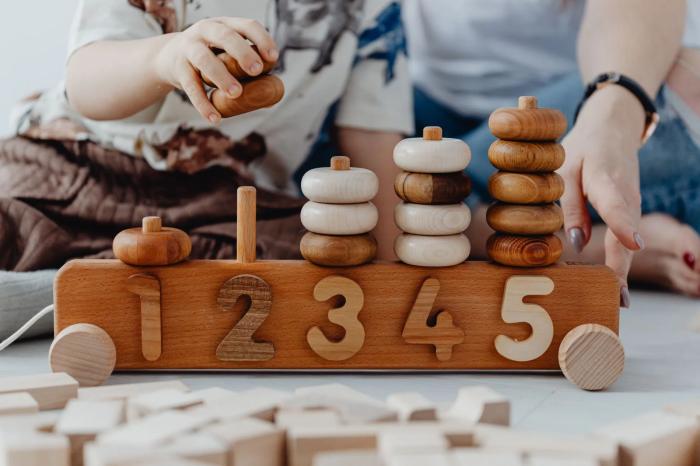Montessori toys are designed to support the educational principles of the Montessori method, which was developed by Dr. Maria Montessori in the early 20th century. This approach to education emphasizes self-directed activity, hands-on learning, and collaborative play. Montessori toys are crafted to be more than just fun; they are tools that encourage exploration, creativity, and cognitive development in children. In this article, we will delve into what Montessori toys are, how they support child development, and how to choose the best Montessori toys for your child.
What Are Montessori Toys
Montessori toys are educational tools designed with specific goals in mind. They align with the Montessori method’s principles, which prioritize:
Child-Centered Learning: Montessori toys are created to be appropriate for a child’s developmental stage. They encourage self-directed play, allowing children to explore and learn at their own pace.
Hands-On Exploration: These toys often come with various textures, shapes, and colors to stimulate a child’s senses. They are designed to be manipulated, explored, and examined.
Fostering Independence: Montessori toys are intended to be simple yet engaging, helping children develop fine motor skills, problem-solving abilities, and independence.
Characteristics of Montessori Toys
Montessori toys have several key characteristics that distinguish them from conventional toys:
Simplicity: They are usually simple in design, focusing on one specific skill or concept. This simplicity helps children concentrate and understand the purpose of the toy.
Natural Materials: Many Montessori toys are made from natural materials like wood, fabric, and metal. These materials are durable and often provide a more tactile experience compared to plastic.
Open-Ended: Montessori toys are often open-ended, meaning they can be used in various ways. For example, a set of wooden blocks can be stacked, sorted, or used in imaginative play.
Educational Value: Each toy is designed to support specific developmental milestones, such as sensory exploration, motor skills, and cognitive development.
How Montessori Toys Support Child Development
Montessori toys play a significant role in supporting a child’s development in several ways:
Sensory Development: Toys like textured balls or sensory bins encourage children to use their senses. They help children explore different textures, colors, and sounds, which is essential for sensory development.
Fine Motor Skills: Toys such as puzzles, stacking rings, and shape sorters help improve fine motor skills. Manipulating small objects and fitting pieces together strengthens the muscles in a child’s hands and fingers.
Cognitive Skills: Montessori toys often involve problem-solving and critical thinking. For instance, toys that require fitting shapes into corresponding slots help children understand spatial relationships and improve their problem-solving abilities.
Language Development: Some Montessori toys are designed to promote language development. For example, toys with pictures and words can help children expand their vocabulary and understanding of language.
Social Skills: Many Montessori toys encourage cooperative play and communication. Toys that involve multiple players or require sharing can help children develop social skills and learn how to interact with others.
Types of Montessori Toys
Montessori toys can be categorized into several types, each supporting different aspects of development:
Sensorial Toys: These toys are designed to stimulate the senses. Examples include sensory bins filled with various materials, textured balls, and sound boxes.
Practical Life Toys: These toys mimic everyday tasks and help children learn practical skills. Examples include toy kitchen sets, gardening tools, and cleaning supplies.
Mathematical Toys: Toys that help children understand basic mathematical concepts, such as counting beads, number puzzles, and shape sorters, fall into this category.
Language Toys: These toys support language development and literacy. Examples include alphabet blocks, storybooks, and language matching games.
Cultural Toys: Montessori toys that introduce children to different cultures and traditions are known as cultural toys. They can include world maps, musical instruments from various cultures, and traditional clothing.
Choosing the Right Montessori Toys
When selecting Montessori toys for your child, consider the following factors:
Age Appropriateness: Choose toys that are suitable for your child’s age and developmental stage. Toys that are too advanced or too simple may not engage your child effectively.
Quality and Safety: Ensure that the toys are made from high-quality, non-toxic materials. Check for safety certifications and avoid toys with small parts that could pose a choking hazard.
Educational Value: Look for toys that align with your child’s developmental needs. Consider what skills or concepts you want to support and choose toys that match those goals.
Engagement: Select toys that will capture your child’s interest and encourage them to explore and play. The best Montessori toys are those that stimulate curiosity and creativity.
See also: At What Age Do Newborns See?
Incorporating Montessori Toys into Daily Life
Incorporating Montessori toys into your child’s daily routine can enhance their development and learning:
Create a Learning Space: Set up a dedicated play area where Montessori toys are easily accessible. Organize the space to allow for free exploration and independent play.
Encourage Independent Play: Allow your child to choose and interact with toys on their own. This fosters independence and helps them develop decision-making skills.
Participate in Play: Engage with your child in their playtime by asking questions, providing guidance, and showing interest in their activities. This can enhance their learning experience and strengthen your bond.
Rotate Toys: Keep your child’s interest fresh by rotating toys periodically. This prevents boredom and encourages continuous exploration and learning.
Summary: Embracing Montessori Toys for Growth and Development
Montessori toys are valuable tools that support a child’s development through purposeful play. By choosing toys that are simple, educational, and aligned with the Montessori principles, parents can foster their child’s sensory, motor, cognitive, and social skills. Understanding the characteristics and benefits of Montessori toys helps parents create a rich learning environment that promotes growth and independence.
As with any educational tool, it’s important to adapt your approach based on your child’s individual needs and interests. By incorporating Montessori toys into your child’s daily routine, you can provide them with meaningful opportunities for exploration and learning, setting a strong foundation for their future development.


